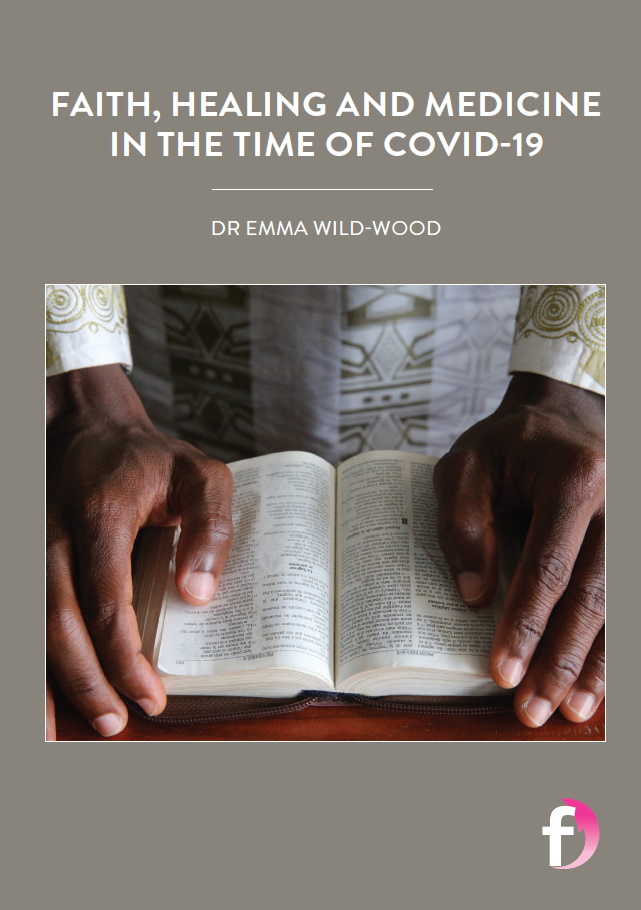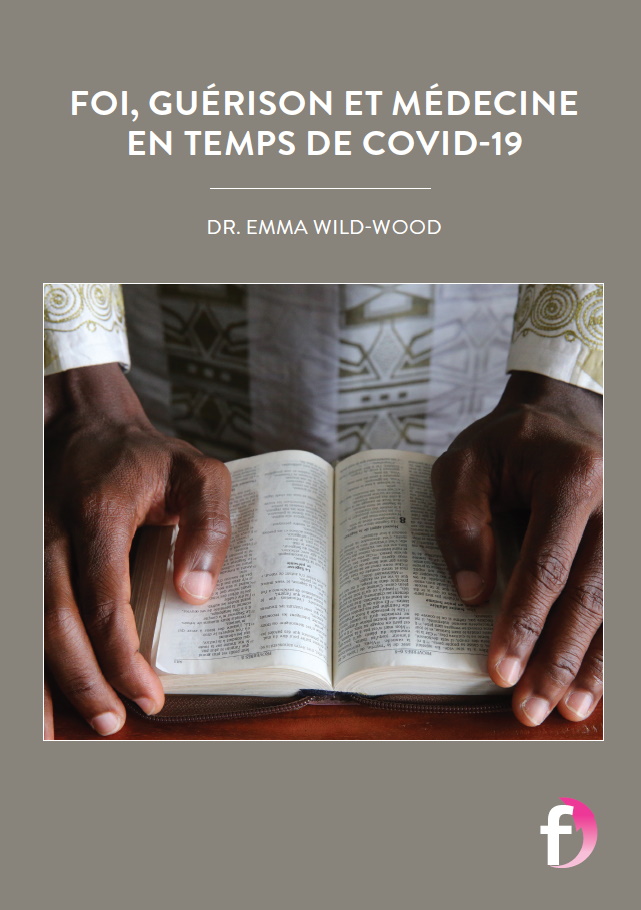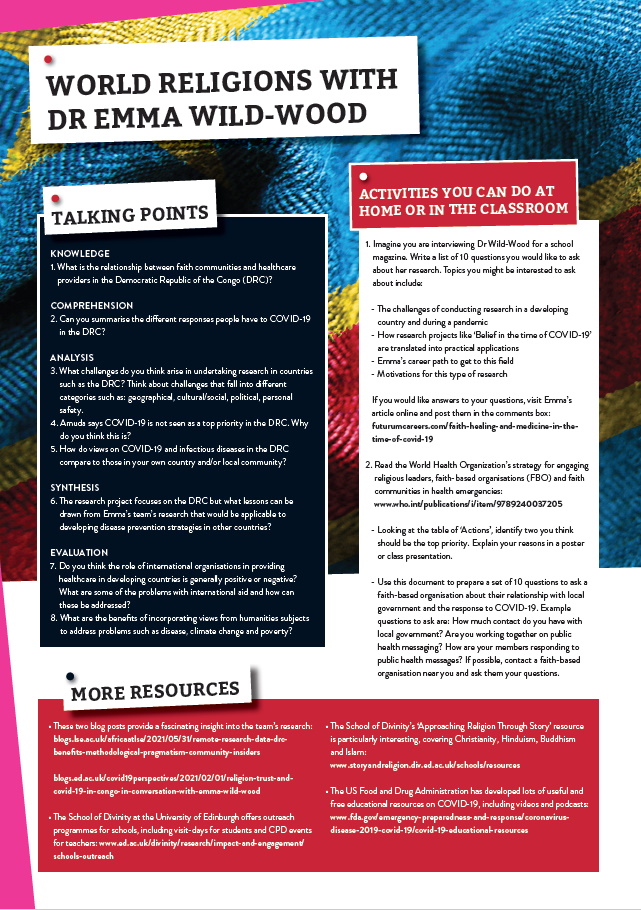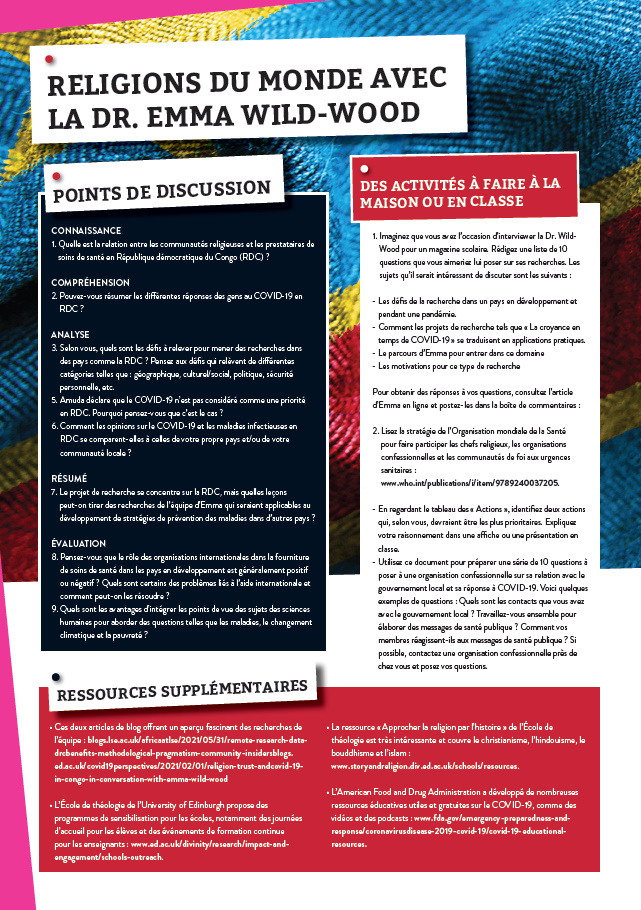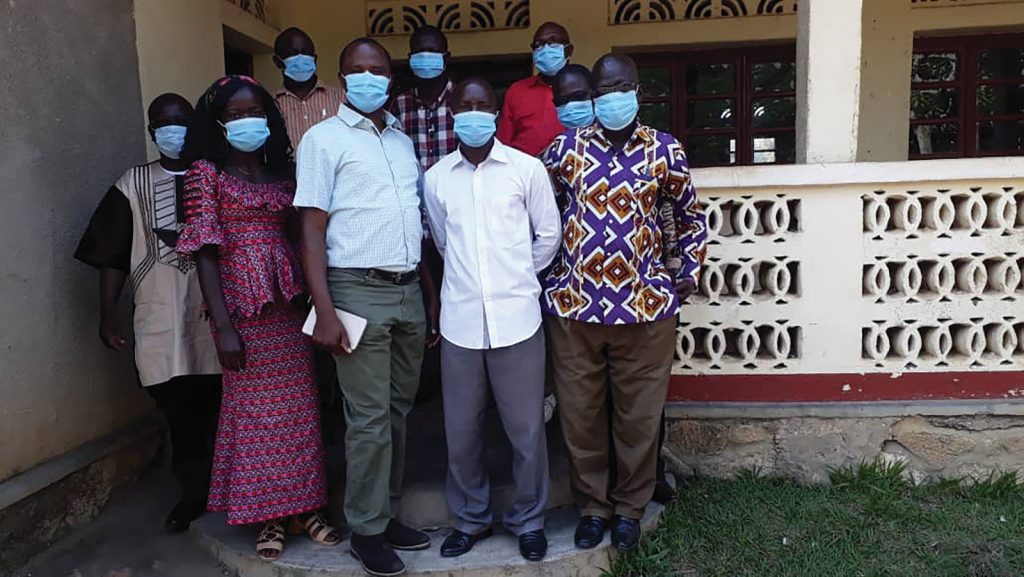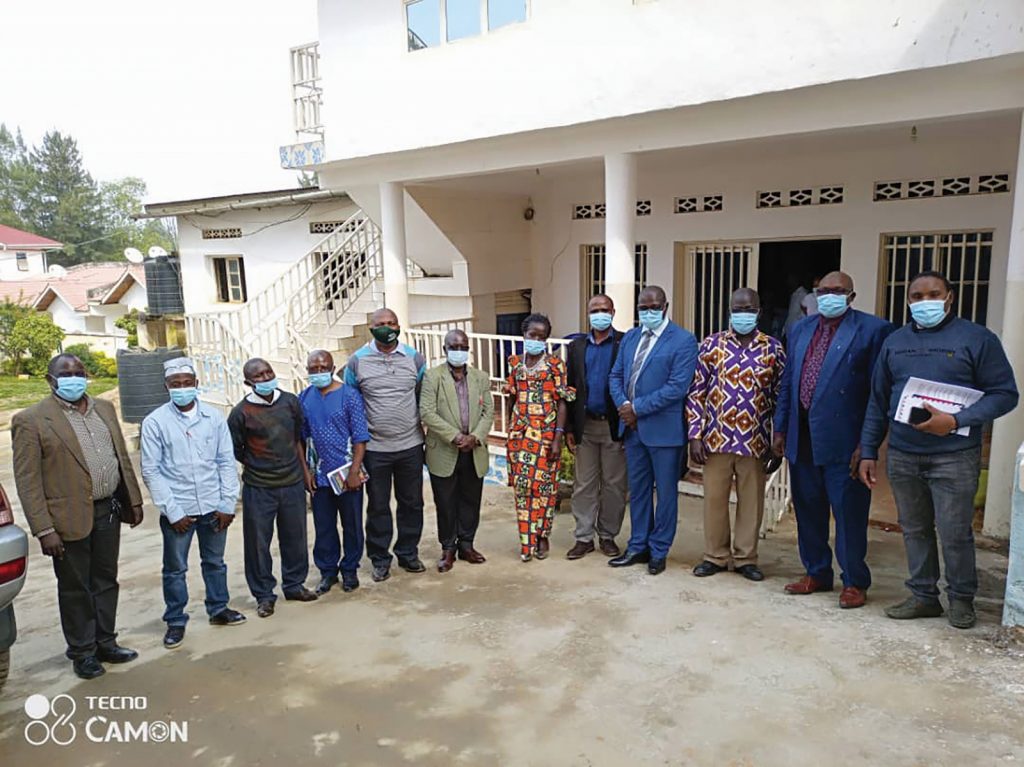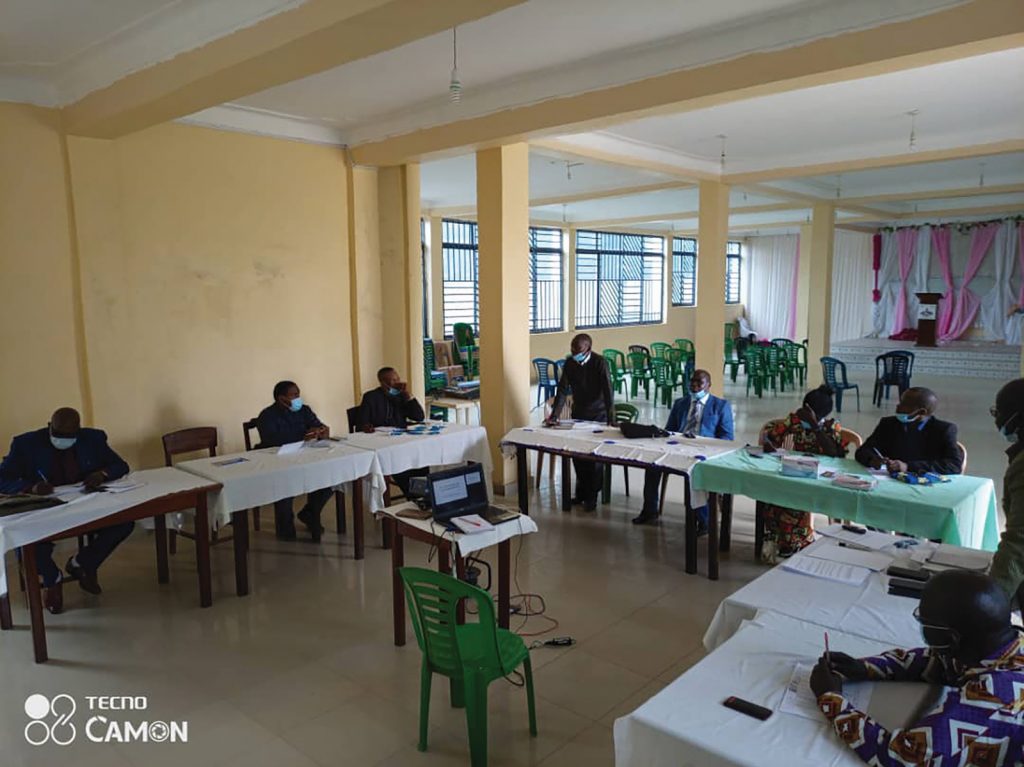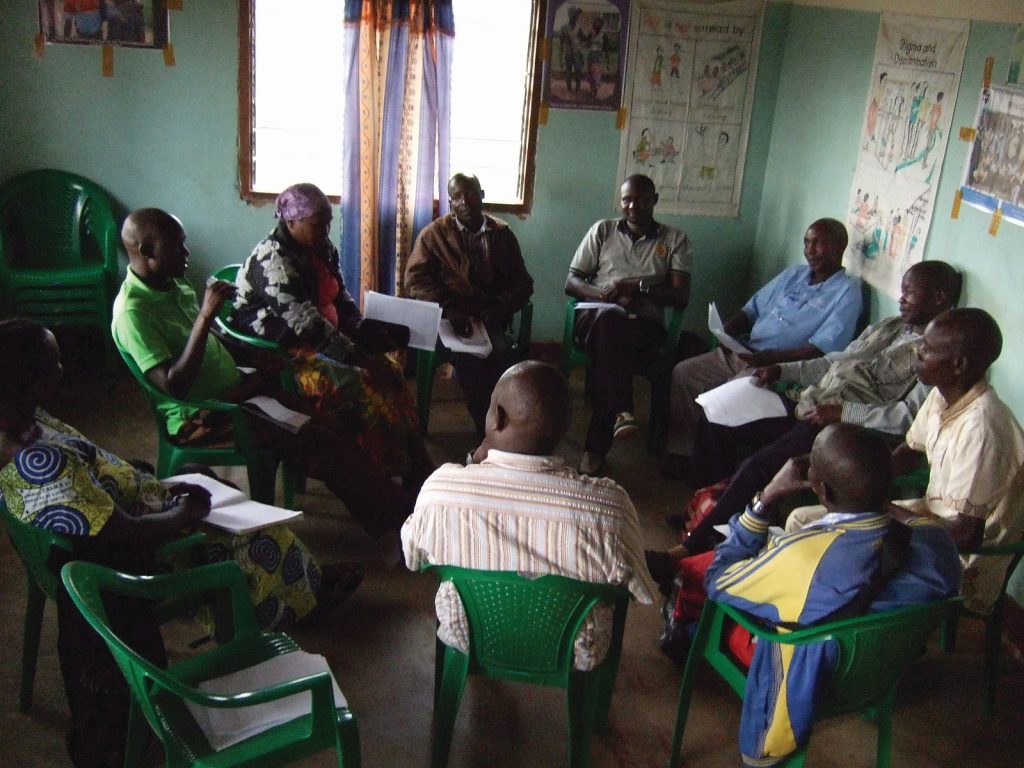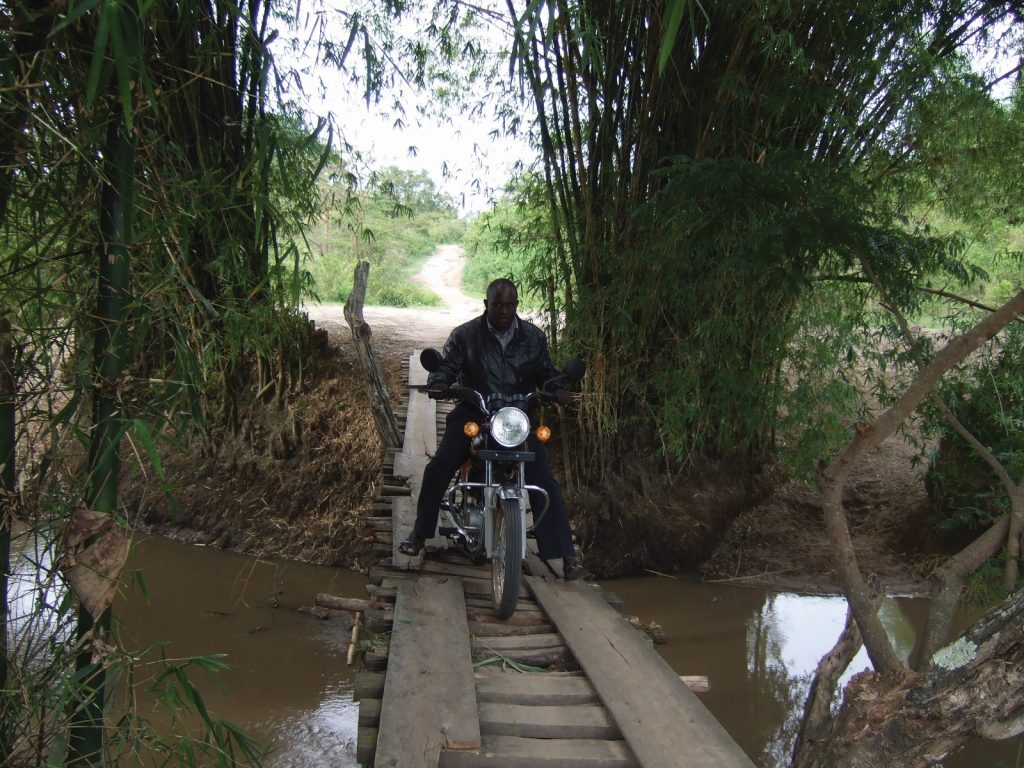Faith, healing and medicine in a time of COVID-19
Faith shapes the way societies respond to crises such as a global pandemic. Dr Emma Wild-Wood, from The University of Edinburgh in the UK, is studying how faith informs responses to the COVID-19 pandemic in the Democratic Republic of Congo, one of Africa’s poorest countries
GLOSSARY
FAITH – a religious belief or a particular religion e.g., Christian faith
BIOMEDICAL – encompassing the sciences and modern medicine
FAITH COMMUNITIES – any group that is organised around a common faith practice, such as churches, mosques or other informal faith groups
FAITH-BASED ORGANISATIONS – structured organisations such as charities or hospitals, which are run by faith groups
INDIGENOUS THERAPEUTIC MODELS – healthcare based on beliefs and practices that originate from within a region’s culture
SOCIO-CULTURAL PERSPECTIVE – awareness of the circumstances surrounding individuals and how their behaviours are affected by social and cultural factors
VENERATION – the act of honouring or respecting someone or something
For many people, the provision of healthcare has little to do with religion and faith. However, in parts of the world, faith communities are the main providers of health services. For example, during the COVID-19 pandemic, religious groups in Africa have played a significant role in providing both healthcare and communicating public health messages. While this role is clearly important, tensions can exist between the ways in which public health officials create responses to disease and the views of faith communities on disease and healing. Without cohesive public health messaging, diseases like COVID-19 are quick to spread.
Dr Emma Wild-Wood is a senior lecturer at the University of Edinburgh’s Centre for the Study of World Christianity. She and a team of experts in the Democratic Republic of Congo (DRC) are working on a project called ‘Belief in the time of COVID-19’. The team is investigating how public health officials and faith leaders communicate with each other, and to the public, on health emergencies. Their aim is to help public officials understand the vital role faith communities play and find ways to improve public health messaging in the DRC.
WHY ARE FAITH COMMUNITIES PROVIDING HEALTHCARE IN DRC?
According to the Pew Research Centre, 95.8% of the population in the DRC is Christian, but a large proportion combine traditional beliefs and practices – such as spirit and ancestor veneration – with Christianity and Islam. Faith communities play a central role in Congolese society and faith leaders hold significant public authority. It is perhaps unsurprising that Congolese people look to faith leaders for guidance on health issues.
“From the 1920s, faith-based medical services of Catholic and Protestant churches have played a large role in providing healthcare,” says Emma. “They introduced biomedical ways of giving healthcare whilst never entirely effacing the indigenous therapeutic models already available to the population. From 1971, they started working on behalf of the DRC’s Ministry of Health in a complex, negotiated system of co-management.” Indeed, faith communities in the DRC were instrumental in leading medical responses to the outbreaks of Ebola (2,250 dead between 2018 and 2020) and measles 6,500 dead since 2019).
WHAT IS THE RESPONSE TO COVID-19 IN THE DRC?
There were 61,932 confirmed cases of COVID-19 and 1,118 deaths in the DRC between 3 January 2020 and 15 December 2021, according to the World Health Organization. As of 10 December 2021, 246,840 people were vaccinated against the disease. Compared with other countries in Europe and North America, for example, the number of COVID-19 infections and deaths in the DRC appears to be relatively low.
While limited diagnostic and testing facilities in the country may, in part, explain these low numbers, the impact of disease outbreaks such as Ebola meant that people were more prepared. For example, in Bunia, the capital city of Ituri Province in the DRC, wash basins became common in homes, offices and commercial buildings after the Ebola epidemic. COVID-19 was first detected in the DRC in March 2020 and, in the same month, many churches closed, following COVID-19 restrictions imposed by President Félix Tshisekedi. Faith leaders also encouraged members to follow government advice on COVID-19.
HOW IS COVID-19 PERCEIVED IN THE DRC?
Emma’s team found that there were three main responses to COVID-19 among Congolese people. Around two-thirds accept that COVID-19 is a disease caused by the transmission of a virus. People who hold this view recognise that public health measures are needed to control the spread of the disease. Prayer can still play an important role in the response to COVID-19, but biomedical treatment is also considered necessary.
A small number of people believe that COVID-19 is a direct intervention from God, the devil, spirits or ancestors. Not all people who hold this belief reject biomedical treatment but, for them, prayer and faith healing are essential to treating the disease. Therefore, the closure of places of worship and restrictions on gatherings was problematic. This is because some people believed that these measures were harming the response to COVID-19 rather than aiding it. Interestingly, this perspective led to the reopening of places of worship, but with precautionary measures, such as avoiding large group gatherings. This made it easier for faith leaders to engage with these communities and deliver public health messages.
A smaller group of people believe that COVID-19 is a fabricated disease, that it does not exist, or that it was created to harm others. This is often associated with a view that the rich and powerful, particularly those in the West, are benefiting from the pandemic in some way. People’s previous experience of the Ebola epidemic had a significant impact on their reactions to COVID. While measures such as the introduction of washbasins were positive, the response to Ebola was largely coordinated by international groups and some national officials. These groups did not involve local communities in the DRC, creating mistrust between health authorities and the public. This was before the health authorities realised the importance of taking differing socio-cultural perspectives into account.
WHAT IMPACT COULD ‘BELIEF IN THE TIME OF COVID-19’ HAVE?
The team hope that understanding the relationship between faith and healthcare in countries like the DRC will lead to more effective communication and cooperation with public health officials. Emma explains, “The language of faith is familiar to people. It is focused on well-being and can be used to communicate good health practice.” Faith leaders are therefore well positioned to deliver public health messages. However, the team’s research has found that faith leaders need training to understand the messages they are transmitting and why they are important, otherwise these messages can be poorly communicated.
From around 2015 onwards, global health authorities started to acknowledge the importance of faith communities. While they are working with faith-based medical services, health officials often try to use faith communities for their own public health ends. Unfortunately, this approach can backfire and create mistrust between public health authorities and faith communities, as the response to Ebola has shown. The research undertaken by Emma’s team demonstrates that a different approach is needed. To cooperate with faith communities effectively, health officials need to understand how faith communities view health and wellbeing, and whether they see their relationship with government as positive.
Officials also need to engage those faith communities that do not have a biomedical approach to healing rather than ignore them or try to impose their views upon them. With this in mind, two of Emma’s Congolese collaborators are planning to write booklets in Swahili, which discuss relationships between faith and health, in order to provide education and training to local faith leaders.
“The World Health Organisation has already been calling for collaboration with faith communities,” Emma explains. “For this to happen, work is still required to understand faith communities. Otherwise, health officials might try to use or manipulate faith communities, instead of recognising their inherent value and working with them in strong partnerships.”
Reference
https://doi.org/10.33424/FUTURUM240
FAITH – a religious belief or a particular religion i.e., Christian faith
BIOMEDICAL – encompassing the sciences and modern medicine
FAITH COMMUNITIES – any group that is organised around a common faith practice, such as churches, mosques or other informal faith groups
FAITH-BASED ORGANISATIONS – structured organisations such as charities or hospitals, which are run by faith groups
INDIGENOUS THERAPEUTIC MODELS – healthcare based on beliefs and practices that originate from within a region’s culture
SOCIO-CULTURAL PERSPECTIVE – awareness of the circumstances surrounding individuals and how their behaviours are affected by social and cultural factors
VENERATION – the act of honouring or respecting someone or something
For many people, the provision of healthcare has little to do with religion and faith. However, in parts of the world, faith communities are the main providers of health services. For example, during the COVID-19 pandemic, religious groups in Africa have played a significant role in providing both healthcare and communicating public health messages. While this role is clearly important, tensions can exist between the ways in which public health officials create responses to disease and the views of faith communities on disease and healing. Without cohesive public health messaging, diseases like COVID-19 are quick to spread.
Dr Emma Wild-Wood is a senior lecturer at the University of Edinburgh’s Centre for the Study of World Christianity. She and a team of experts in the Democratic Republic of Congo (DRC) are working on a project called ‘Belief in the time of COVID-19’. The team is investigating how public health officials and faith leaders communicate with each other, and to the public, on health emergencies. Their aim is to help public officials understand the vital role faith communities play and find ways to improve public health messaging in the DRC.
WHY ARE FAITH COMMUNITIES PROVIDING HEALTHCARE IN DRC?
According to the Pew Research Centre, 95.8% of the population in the DRC is Christian, but a large proportion combine traditional beliefs and practices – such as spirit and ancestor veneration – with Christianity and Islam. Faith communities play a central role in Congolese society and faith leaders hold significant public authority. It is perhaps unsurprising that Congolese people look to faith leaders for guidance on health issues.
“From the 1920s, faith-based medical services of Catholic and Protestant churches have played a large role in providing healthcare,” says Emma. “They introduced biomedical ways of giving healthcare whilst never entirely effacing the indigenous therapeutic models already available to the population. From 1971, they started working on behalf of the DRC’s Ministry of Health in a complex, negotiated system of co-management.” Indeed, faith communities in the DRC were instrumental in leading medical responses to the outbreaks of Ebola (2,250 dead between 2018 and 2020) and measles 6,500 dead since 2019).
WHAT IS THE RESPONSE TO COVID-19 IN THE DRC?
There were 61,932 confirmed cases of COVID-19 and 1,118 deaths in the DRC between 3 January 2020 and 15 December 2021, according to the World Health Organization. As of 10 December 2021, 246,840 people were vaccinated against the disease. Compared with other countries in Europe and North America, for example, the number of COVID-19 infections and deaths in the DRC appears to be relatively low.
While limited diagnostic and testing facilities in the country may, in part, explain these low numbers, the impact of disease outbreaks such as Ebola meant that people were more prepared. For example, in Bunia, the capital city of Ituri Province in the DRC, wash basins became common in homes, offices and commercial buildings after the Ebola epidemic. COVID-19 was first detected in the DRC in March 2020 and, in the same month, many churches closed, following COVID-19 restrictions imposed by President Félix Tshisekedi. Faith leaders also encouraged members to follow government advice on COVID-19.
HOW IS COVID-19 PERCEIVED IN THE DRC?
Emma’s team found that there were three main responses to COVID-19 among Congolese people. Around two-thirds accept that COVID-19 is a disease caused by the transmission of a virus. People who hold this view recognise that public health measures are needed to control the spread of the disease. Prayer can still play an important role in the response to COVID-19, but biomedical treatment is also considered necessary.
A small number of people believe that COVID-19 is a direct intervention from God, the devil, spirits or ancestors. Not all people who hold this belief reject biomedical treatment but, for them, prayer and faith healing are essential to treating the disease. Therefore, the closure of places of worship and restrictions on gatherings was problematic. This is because some people believed that these measures were harming the response to COVID-19 rather than aiding it. Interestingly, this perspective led to the reopening of places of worship, but with precautionary measures, such as avoiding large group gatherings. This made it easier for faith leaders to engage with these communities and deliver public health messages.
A smaller group of people believe that COVID-19 is a fabricated disease, that it does not exist, or that it was created to harm others. This is often associated with a view that the rich and powerful, particularly those in the West, are benefiting from the pandemic in some way. People’s previous experience of the Ebola epidemic had a significant impact on their reactions to COVID. While measures such as the introduction of washbasins were positive, the response to Ebola was largely coordinated by international groups and some national officials. These groups did not involve local communities in the DRC, creating mistrust between health authorities and the public. This was before the health authorities realised the importance of taking differing socio-cultural perspectives into account.
WHAT IMPACT COULD ‘BELIEF IN THE TIME OF COVID-19’ HAVE?
The team hope that understanding the relationship between faith and healthcare in countries like the DRC will lead to more effective communication and cooperation with public health officials. Emma explains, “The language of faith is familiar to people. It is focused on well-being and can be used to communicate good health practice.” Faith leaders are therefore well positioned to deliver public health messages. However, the team’s research has found that faith leaders need training to understand the messages they are transmitting and why they are important, otherwise these messages can be poorly communicated.
From around 2015 onwards, global health authorities started to acknowledge the importance of faith communities. While they are working with faith-based medical services, health officials often try to use faith communities for their own public health ends. Unfortunately, this approach can backfire and create mistrust between public health authorities and faith communities, as the response to Ebola has shown. The research undertaken by Emma’s team demonstrates that a different approach is needed. To cooperate with faith communities effectively, health officials need to understand how faith communities view health and wellbeing, and whether they see their relationship with government as positive.
Officials also need to engage those faith communities that do not have a biomedical approach to healing rather than ignore them or try to impose their views upon them. With this in mind, two of Emma’s Congolese collaborators are planning to write booklets in Swahili, which discuss relationships between faith and health, in order to provide education and training to local faith leaders.
“The World Health Organisation has already been calling for collaboration with faith communities,” Emma explains. “For this to happen, work is still required to understand faith communities. Otherwise, health officials might try to use or manipulate faith communities, instead of recognising their inherent value and working with them in strong partnerships.”
ABOUT WORLD RELIGIONS
Religion has played an integral role in shaping societies across the globe for millennia and continues to have a public and collective role today. It is therefore very important to study world religions and people’s religious beliefs. As the work of Emma’s team has shown, responses to events such as disease, famine and environmental crises are influenced by beliefs. Solutions to challenges that may work in one region of the world may be completely inappropriate in another.
“Aspects of society – like health – are influenced by both the distinctions between faith traditions and the way in which they sometimes overlap,” says Emma. “Understanding these great human traditions tells a lot about who we are, and also it contributes to improving societal problems – like disease. Indigenous religions have traditionally been neglected in the study of world religions. As humans recognise the need for planetary health, they are seeking the wisdom of indigenous peoples who live close to the land.”
THE IMPORTANCE OF HUMANITIES
According to Learn.com, “The humanities refer to courses in two major categories, arts and culture, that are designed to enrich a student’s knowledge of the world beyond their own life.” The study of humanities subjects like religion provides us with frameworks to understand how solutions to challenges such as disease, climate change and poverty can be applied in different cultural and societal settings. “Studying humanities enables us to think outside the box and engage with philosophies, beliefs, practices and behaviours that are different to our own,” says Emma. “It inculcates respect and understanding for the way humans operate in the world.”
A PATHWAY TO A BROAD RANGE OF CAREERS
Given the many transferable skills humanities subjects such as religious studies can offer, graduates can find themselves working in a broad range of sectors from charities to journalism, teaching, civil service, cultural heritage and retail management. “A degree in humanities gives a great foundation for someone who wants to develop skills whilst not being sure exactly what they want to do,” says Emma. “I firmly recommend taking a theology and religious studies degree. It does all the things mentioned above, and it’s so varied – philosophy, sociology and anthropology, literature and languages, law and history. Students get a wide disciplinary education with a focus on things that have made the world go round for millennia – religions!”
MEET EMMA
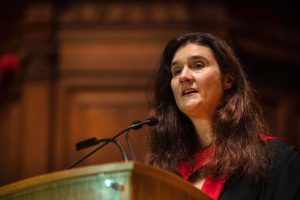
When I left school, I didn’t know what I wanted to be. I had travelled as a student and learned a lot from being in different societies. I wanted to learn more and to give back, so I looked for a position that would enable me to spend more time in one place and develop a more profound understanding of the people there. I taught history and theology in the DRC and Uganda for a number of years.
I studied theology at the University of Edinburgh because I wanted to gain an academic understanding of my own Christian faith and heritage. I became increasingly interested in the way in which Christianity and Indigenous religions interacted in Africa, particularly exploring how and why people changed and adapted religious traditions. It’s important to study places and people in the world that are often overlooked.
I have learned a lot from people and events that appear marginal to the dominant concerns of our own society. I have a much greater appreciation of the impact of Christianity and other religious traditions on the world – both positive and negative. I have learned greater empathy and appreciation for people who live different lives from my own.
I enjoy teaching students – often about things they have never been able to study before. I enjoy the connection and collaboration with people across the globe, like the Congolese team on this project who brought new perspectives to our work.
EMMA’S TOP TIPS
01 Study what fascinates you.
02 Make sure you understand the methods and theories behind the academic study.
03 Go into the world, meet people and see if the theory matches the lived experience.
MEET AMUDA
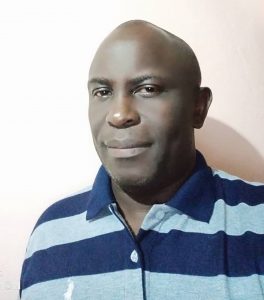
Dr Amuda Baba Dieu-Merci is a lecturer in public health at the Anglican University of Congo and nursing colleges in Bunia. He is also CEO of the Pan African Institute of Community Health in the DRC and member of the ‘Belief in the time of COVID-19’ research project.
‘Belief in the time of COVID-19’ has contributed to strengthening the relationships between, and cohesion of, different faith communities, as they have realised that, together, they can be more effective in dealing with future outbreaks and disasters.
Conducting this research amidst health threats (COVID-19), conflict, and fragile social and health systems has exposed many challenges in the DRC: poverty, the proliferation of churches with diverse beliefs on social and health-related issues, and COVID-19 not being a top priority.
What I enjoy about my work is listening to and observing community members as they deal with different life issues, particularly in rural and remote areas of the DRC. I like having the opportunity to use participatory active approaches. These approaches empower community members to come up with their own solutions to challenges.
The late Dr Patricia Jane Nickson inspired me to study community health at IPASC University College in the DRC and the Liverpool School of Tropical Medicine in the UK. Her lifestyle, community approach and integration, and capacity to listen to and observe communities was so inspiring.
It isn’t usual for students in DRC to follow in my footsteps, as many choose to study law, economics, medicine, social sciences and international relations. But, as I’m a lecturer in community and public health, some of my students say they would like to benefit from the same training I received. I’m always very open to discussing these opportunities with them, even outside the lecture hall, in churches, at home and in social gatherings.
AMUDA’S TOP TIPS
01 Listen to your heart to understand what your passion is.
02 Spend time with your local community to understand people’s different experiences and the challenges they face.
03 Find a role model whose life inspires you.
04 There are no drafts in life. Whatever you choose to do, do it with complete commitment and love.
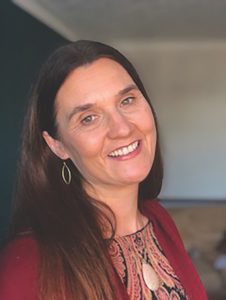 DR EMMA WILD-WOOD
DR EMMA WILD-WOOD
Senior Lecturer in African Christianity and African Indigenous Religions, Centre for the Study of World Christianity, University of Edinburgh, UK
RESEARCH PROJECT: ‘Belief in the time of COVID-19’ – Understanding the relationships between faith, society and responses to disease during the COVID-19 pandemic in the Democratic Republic of the Congo (DRC)
TEAM: University of Edinburgh, UK: Dr Jean Benoit Falisse (African Studies and Development), Dr Liz Grant (Global Health Institute); Anglican University of Congo, DRC: Dr Amuda Baba (Public Health), Dr Yossa Way (Theology), Sadiki Kangamina (Biblical Studies and Rector); Primary Care International: Dr Nigel Pearson (Health Consultant in Fragile States and General Practitioner)
FUNDER: Arts and Humanities Research Council (AHRC)
 DR EMMA WILD-WOOD
DR EMMA WILD-WOOD
Senior Lecturer in African Christianity and African Indigenous Religions, Centre for the Study of World Christianity, University of Edinburgh, UK
RESEARCH PROJECT: ‘Belief in the time of COVID-19’ – Understanding the relationships between faith, society and responses to disease during the COVID-19 pandemic in the Democratic Republic of the Congo (DRC)
TEAM: University of Edinburgh, UK: Dr Jean Benoit Falisse (African Studies and Development), Dr Liz Grant (Global Health Institute); Anglican University of Congo, DRC: Dr Amuda Baba (Public Health), Dr Yossa Way (Theology), Sadiki Kangamina (Biblical Studies and Rector); Primary Care International: Dr Nigel Pearson (Health Consultant in Fragile States and General Practitioner)
FUNDER: Arts and Humanities Research Council (AHRC)
Do you have a question for Emma?
Write it in the comments box below and Emma will get back to you. (Remember, researchers are very busy people, so you may have to wait a few days.)

